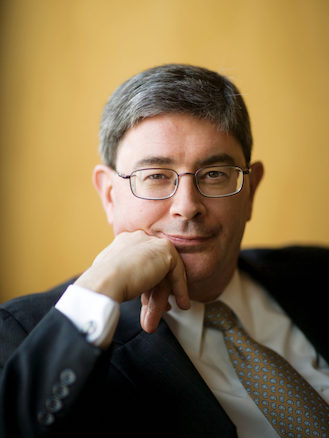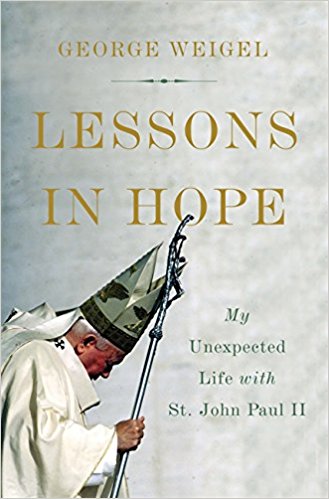A foible common to movers and shakers, whether clerical or lay, is a penchant for checking the index of a newly published book to see whether their names appear – and how often. I suspect that George Weigel’s newest book will provoke a good deal of surreptitious peeking.
Lessons in Hope: My Unexpected Life with St. John Paul II recounts, in fascinating and insightful detail, the providential encounters that contributed to Weigel’s magisterial two-volume portrait of the Polish pontiff: Witness to Hope and The End and the Beginning. Weigel details the many personal meetings he had with John Paul, as well as with his friends and collaborators, both in Poland and the Vatican. These lengthy and substantive encounters provided much of the rich material for his biography.
From the new book, one learns a good deal about John Paul II, particularly in the more intimate setting of shared meals. For John Paul reveled in conversation. As one collaborator remarked of him: “all conversation, all the time.”
But one also learns a great deal about the portrait painter himself. And one might confidently assert of Weigel as well: he too revels in all conversation all the time. His new book narrates countless conversations, not only with John Paul but also with many individuals who knew the future pope from his days as parish priest and university professor, through his lengthy and amazingly fruitful pontificate, to that final witness to hope: his very public suffering and death.
Weigel’s fine intellect and delight in friendship shine forth in this memoir. Even when disagreeing with those whom he interviews (as in the case of those who promoted Paul VI’s Ostpolitik – seeking accommodation with the Communist regimes of Eastern Europe), he shows deep respect for a shared humanity and its inevitable fragility.
The book is written with Weigelian verve, replete with quotable anecdotes that are often amusing and always telling. Here is a snapshot of a curial official: “a wily old thing . . . adept at tacking to the prevailing ecclesiastical winds.” Plus ça change! Nor is Weigel innocent of a certain wiliness of his own, as when he leaves behind in Poland some “Kentucky succor:” W.L. Weller’s Special Reserve, so as to be adequately supplied upon his return. The prudential precaution came in handy as it lubricated a conversation with a New York Times correspondent on the next visit.
What are the “lessons” that we can take away from the book? Here are four I culled from my reading (if I err, I may well find my name listed in the index of Weigel’s next).
First, spirited conversation is always to be preferred to flaccid dialogue. Weigel admires the courageous forthrightness of John Paul for whom “speaking the truth to power” was far more than a rhetorical pose. Like the Czech dissident, Vaclav Havel, living in truth is the only sure counter to a regime’s lies.
Second, discernment requires objective criteria grounded in the reality of Jesus Christ. In this vein, John Paul’s predilection for number 22 of Gaudium et Spes is well-known:
The truth is that only in the mystery of the incarnate Word does the mystery of man take on light. For Adam, the first man, was a figure of Him Who was to come, namely Christ the Lord. Christ, the final Adam, by the revelation of the mystery of the Father and His love, fully reveals man to man himself and makes his supreme calling clear.
Thus reads the often cited first paragraph with its important focus upon the revelatory significance of the Christ event.

But the third paragraph of number 22 of the Pastoral Constitution is of equal importance. There we find this crucial soteriological affirmation: “In Christ God reconciled us to Himself and among ourselves; from bondage to the devil and sin He delivered us, so that each one of us can say with the Apostle: The Son of God ‘loved me and gave Himself up for me’ (Gal. 2:20). By suffering for us He not only provided us with an example for our imitation, He blazed a trail, and if we follow it, life and death are made holy and take on a new meaning.” “Suffering for us;” this standard clearly entered into John Paul’s discernment of his own personal calling . . . and its cost.
A third lesson is a new appreciation of John Paul’s vision of a Christ-centered humanism that sees the proclamation and defense of human rights as imperative, whether in Europe or the Americas, Africa or Asia. In face of the partisan divides and tribalisms of both left and right, he advocated, in Weigel’s words, “a public Church that was not a partisan Church: a Church that shaped public life by forming culture through the evangelization and catechesis of the people.”
And a fourth and final lesson concerns the importance of the virtue of solidarity: a solicitude for the common good, for the social fabric of a nation and, ultimately, a radical commitment to a truly just world order. But like all virtues, solidarity must be cultivated through the practice of what John Paul, in his splendid apostolic letter, Novo Millennio Ineunte, called “a spirituality of communion.” Such spirituality is the only effective antidote to our culture’s buffered and consumerist individualism
At the close of each of his many dinners with John Paul, after a hearty embrace with the pope, Weigel would bid farewell to the other guests and gather his things together. By the time he was ready to leave, John Paul had already repaired to the chapel to pray. The pope brought human solidarity into his solidarity with the Lord. In those extended times, spent in prayerful adoration before the Blessed Sacrament, one witnesses not the making of a portrait, but the making of a saint.















